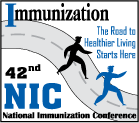
|
|
CDC NIP/NIC Home Page
|
Tuesday, March 18, 2008
245
Evaluation of an Infant Hepatitis B Vaccination Program in a U.S. Affiliated Jurisdiction—Republic of the Marshall Islands, 2007
Gayle Fischer, Division of Viral Hepatitis/Epidemiology and Surveillance Branch, CDC, 1600 Clifton Road NE, MS G-37, Atlanta, GA, USA
Learning Objectives for this Presentation:
By the end of the presentation, participants will be able to:
1. Describe main modes of hepatitis B virus (HBV) transmission in highly endemic countries and the vaccination strategy to prevent transmission
2. Understand the importance of serosurveys in evaluating the impact of Hepatitis B (HB) vaccination.
Background:
HBV is highly endemic in the Republic of the Marshall Islands (RMI); with ≥8% of adults chronically infected. In high endemicity countries, most infections are acquired perinatally or in early childhood, and 90% of infants infected with HBV remain chronically infected. Providing HB vaccine within 24 hours of birth and two subsequent doses is 70-90% effective at preventing early acquisition, so RMI started routine HB infant vaccination in the early 1990s.
Objectives:
To evaluate the impact of RMI's HB infant immunization program on prevention of chronic HBVinfection.
Methods:
In 2007 we conducted cross-sectional serosurveys among first graders and pregnant women on Ebeye and Majuro, RMI. Children were selected from classrooms chosen randomly based on probabilities proportionate to size. For comparison, women attending perinatal clinics were asked to participate. Serum samples were tested for antibodies to hepatitis B core antigen (anti-HBc), and for chronic infection; indicated by the presence of hepatitis B surface antigen (HBsAg-positive).
Results:
331/761 (44%) of eligible first graders participated, 92% of whom received 3 doses of HB vaccine. Only 6/331 (1.8%) were HBsAg-positive, so 3-dose HB vaccine coverage was 98% effective in preventing chronic HBV infections. 116 women attending prenatal clinics participated; of whom 11 (10%) were HBsAg-positive.
Conclusions:
This study demonstrates significant reduction in HBV seroprevalence that occurred in RMI following introduction of infant immunization. Since chronic hepatitis B does not usually manifest until adulthood and the impact of infant immunization would not otherwise be realized until decades after introduction, these serosurveys are critical.
See more of Exhibit and Poster Viewing Session (and Break)
See more of The 42nd National Immunization Conference (NIC)
See more of The 42nd National Immunization Conference (NIC)